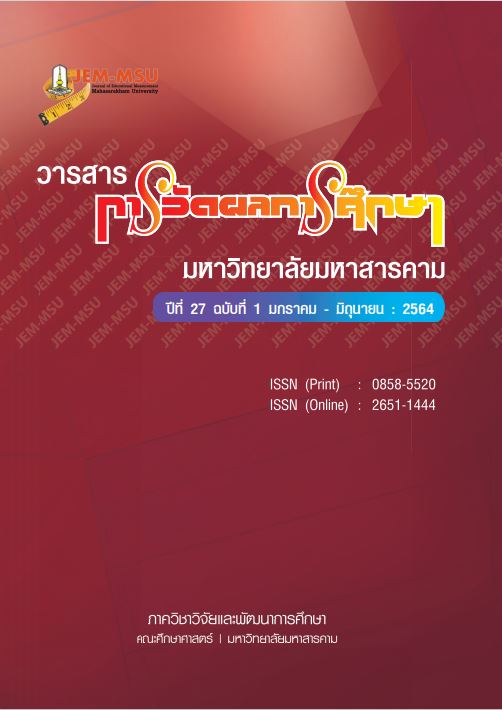Need Assessment for Development of Information Management Competencies of Academic Supporting Personnel Responsible for Quality Assurance at Rajamangala Universities of Technology in the Central Region: A Complete Need Assessment
Main Article Content
Abstract
The objectives of this study were to 1) evaluate and prioritize the needs for development of information management competencies of academic supporting personnel responsible for educational quality assurance, 2) analyze the causes of the needs for development of information management competencies, and 3) study the guidelines for development of information management competencies. The study was a complete need assessment conducted with a mixed-method research methodology. The instrument used for data collection in Phase 1 was an information management competency questionnaire. The sample consisted of 92 academic supporting personnel responsible for educational quality assurance at Rajamangala Universities of Technology in the central region, obtained through stratified random sampling. The data were analyzed by using the mean, standard deviation, and an analysis using the revised needs assessment index. In Phase 2, an interview form was used to find the causes of needs for development of information management competencies. Ten key informants were selected in accordance with the specified qualifications. The tool used for data collection in Phase 3 was an interview form for guidelines for information management competency development. Three key informants were selected in accordance with the specified qualifications. Qualitative data analysis for Phase 2 and Phase 3 were conducted by checking the content for the significant statement, then the data were categorized to find the connection between the data and were summarized as themes. The findings were as follows:
1. The overall results of evaluating and prioritizing the needs for development of information management competencies showed that the most needed competency was information management knowledge, followed by skills in information management and attitude towards information management.
2. The main cause of the need for development of information management competencies was that the academic supporting personnel responsible for educational quality assurance lacked knowledge of information management and information management skills. The secondary reason was that executives focused on the result of educational quality assurance rather than the development of academic supporting personnel’s competencies necessary for their work.
3. The guidelines for development of information management competencies comprised organizing learning processes through practices that focus on empowerment and group learning atmosphere, exchanging of experiences, positive question forming and freedom of appropriate decision making for oneself.
Article Details
The content and information contained in the published article in the Journal of Educational Measurement Mahasarakham University represent the opinions and responsibilities of the authors directly. The editorial board of the journal is not necessarily in agreement with or responsible for any of the content.
The articles, data, content, images, etc. that have been published in the Journal of Educational Measurement Mahasarakham University are copyrighted by the journal. If any individual or organization wishes to reproduce or perform any actions involving the entirety or any part of the content, they must obtain written permission from the Journal of Educational Measurement Mahasarakham University.
References
กันยปริณ ทองสามสี. (2558). การพัฒนาแบบวัดสมรรถนะสำหรับบุคลากรสายงานประกันคุณภาพในสถาบันอุดมศึกษา. วารสารพฤติกรรมศาสตร์ สถาบันวิจัยพฤติกรรมศาสตร์ มหาวิทยาลัยศรีนครินทรวิโรฒ ปีที่ 21 ฉบับที่ 2 (กรกฎาคม 2558).
กรรณิกา บูระวงษ์ และถนอมวรรณ ประเสริฐเจริญสุข. (2560). โมเดลสมการโครงสร้างปัจจัยเชิงสาเหตุสมรรถนะการปฏิบัติงานของบุคลากรสายสนับสนุน มหาวิทยาลัยขอนแก่น. วารสารศึกษาศาสตร์ ฉบับวิจัยบัณฑิตศึกษา มหาวิทยาลัยขอนแก่น, 11(3), 1-12.
ชูชัย สมิทธิไกร. (2556). การสรรหา การคัดเลือก และการประเมินผลการปฏิบัติงานของบุคลากร. พิมพ์ครั้งที่ 4 กรุงเทพฯ: โรงพิมพ์แห่งจุฬาลงกรณ์มหาวิทยาลัย.
ณรงค์วิทย์ แสนทอง. (2547). มารู้จัก COMPETENCY กันเถอะ. กรุงเทพ: เอช อาร์ เซ็นเตอร์.
นิภาพรรณ เจนสันติกุล. (2561). สภาพปัญหาด้านบุคลากรในสถาบันอุดมศึกษาของรัฐในภูมิภาคตะวันตก. วารสารวิชาการเซาธ์อีสท์บางกอก. 4(1), 1-14
บัณฑิตพงศ์ ท้าวทุมมา และคณะ. (2560). การจัดระบบสารสนเทศเพื่อการประกันคุณภาพภายในของโรงเรียนช่องฟ้าชินเชิงวาณิชบำรุง จังหวัดเชียงใหม่. Veridian E-Journal ฉบับภาษาไทย สาขามนุษยศาสตร์ สังคม และศิลปะ มหาวิทยาลัยศิลปากร, 10(3), 2189-2204.
บุญชัย บุญโสภณ และสุวัฒน์ เงินฉ่ำ. (2559). ยุทธศาสตร์การจัดการสารสนเทศเพื่อการประกันคุณภาพภายในสถานศึกษา สังกัดองค์กรส่วนท้องถิ่น. วารสารวิชาการมหาวิทยาลัยอีสเทิร์นเอเชีย, 6(3), 111-118.
บุญเลิศ กลิ่นรัตน์. (2542). การบริหารทรัพยากรมนุษย์. เชียงใหม่: คณะวิทยาการจัดการ สถาบันราชภัฏเชียงใหม่.
พรรษวุฒิ จูโพธิ์แก้ว. (2559). การจัดการสารสนเทศเพื่อการประกันคุณภาพการศึกษา: ข้อเสนอรูปแบบและการประยุกต์ใช้. วารสารการวัดผลการศึกษา. 33(94), 22-31.
ภาวิณี แสนชนม์ และ น้ำทิพย์ วิภาวิน. (2561). การสังเคราะห์งานวิจัยด้านการจัดการสารสนเทศ. วารสารมนุษยศาสตร์และสังคมศาสตร์ มหาวิทยาลัยราชภัฏอุดรธานี, 7(1), 23-42.
ภิราช รัตนันต์. (2560). การจัดการทรัพยากรมนุษย์ร่วมสมัยในองค์การ. วารสารบริหารธุรกิจและการบัญชี มหาวิทยาลัยขอนแก่น, 1(1), 21-38.
มหาวิทยาลัยเทคโนโลยีราชมงคลธัญบุรี. (2560). ยุทธศาสตร์และแผนการพัฒนา มหาวิทยาลัยเทคโนโลยีราชมงคลธัญบุรี 20 ปี พ.ศ.2560-2579. มหาวิทยาลัยเทคโนโลยีราชมงคลธัญบุรี: ศูนย์นวัตกรรมการออกแบบและสื่อคอนเวอร์เจนซ์.
วีระ อรัญมงคล และรัชฎา ธิโสภา. (2549). รูปแบบการพัฒนาทรัพยากรมนุษย์ในสถาบันอุดมศึกษา: กรณีศึกษาสถาบันเทคโนโลยีพระจอมเกล้าพระนครเหนือ. วารสารวิชาการเทคโนโลยีอุตสาหกรรม, 2(1), 70-76.
วัฒนา นนทชิต. (2558). การจัดการสารสนเทศเพื่อการรับรองมาตรฐานของโรงพยาบาล. วารสารวิชาการมหาวิทยาลัยราชภัฏอุตรดิตถ์, 10(2), 152-166.
สำนักงานคณะกรรมการการอุดมศึกษา. (2558). คู่มือการประกันคุณภาพการศึกษาภายใน ระดับอุดมศึกษา พ.ศ.2557. พิมพ์ครั้งที่ 5 กรุงเทพฯ: โรงพิมพ์ภาพพิมพ์.
สุภาวดี ขุมทองจันทร์. (2559). การบริหารทรัพยากรมนุษย์อย่างบูรณาการ. กรุงเทพ: บริษัท ซีเอ็ด ยูเคชั่น จำกัด (มหาชน).
สุวิมล ว่องวานิช. (2548). การวิจัยการประเมินความต้องการจำเป็น. พิมพ์ครั้งที่ 3 ฉบับปรับปรุง กรุงเทพ: สำนักพิมพ์แห่งจุฬาลงกรณ์มหาวิทยาลัย.
สมบูรณ์ ศิริสรรหิรัญ และคณะ. (2561). การประยุกต์ใช้ความรู้จากการฝึกอบรมและสมรรถนะในการดำเนินงานเชิงกลยุทธ์. Veridian E-Journal ฉบับภาษาไทย สาขามนุษยศาสตร์ สังคม และศิลปะ มหาวิทยาลัยศิลปากร, 11(1), 2318-2332.
สร้อยขวัญ เสมอพิทักษ์ และ ภรณี ศิริโชติ. (2553). การจัดการสารสนเทศเพื่อการประกันคุณภาพของคณะวิชา มหาวิทยาลัยเกษตรศาสตร์ วิทยาเขตเฉลิมพระเกียรติ จังหวัดสกลนคร. วารสารสนเทศศาสตร์, 28(3), 45-56.
องอาจ นัยพัฒน์. (2561). การวิจัยสถาบัน : เครื่องมือพัฒนาสถาบันสู่ความเป็นเลิศ. กรุงเทพฯ: โรงพิมพ์สามลดา.
อรอุมา ขันธพาลี. (2560). แนวทางการจัดการระบบสารสนเทศเพื่อการประกันคุณภาพภายในสถานศึกษา สังกัดสำนักงานเขตพื้นที่การศึกษาประถมศึกษาพระนครศรีอยุธยา เขต 1. วารสารครุศาสตร์ปริทรรศน์ มหาวิทยาลัยมหาจุฬาลงกรณราชวิทยาลัย ปีที่ 4 ฉบับที่ 2 (พฤษภาคม-สิงหาคม 2560).
อาวุธ รื่นภาคพจน์. (2553). ความรู้ ทักษะ และทัศนคติขององค์กรปกครองส่วนท้องถิ่น ในการจัดการสารสนเทศเพื่อการวางแผน: กรณีศึกษาอำเภอเมือง จังหวัดขอนแก่น. วิทยานิพนธ์ปริญญาศิลปศาสตรมหาบัณฑิต มหาวิทยาลัยขอนแก่น.
อิทธิพัทธ์ สุวทันพรกูล. (2561). การวิจัยทางการศึกษา : แนวคิดและการประยุกต์ใช้. กรุงเทพฯ: โรงพิมพ์แห่งจุฬาลงกรณ์มหาวิทยาลัย.
Brain Detlor. (2010). Information Management. International Journal of Information Management.
Chun Wei Choo. (1995). Information Management for the Intelligent Organization: Roles and Implication for the Information Professions. Paper presented at the 1995 Digital Libraries, March 27-28, 1995. Singapore.
Daniel Projogo., et al. (2018). The relationships between information management, process management and operational performance: Internal and external contexts. International Journal of Production Economics.
David C. McClelland. (1973). Testing for competence rather than for “intelligence”. American psychologist.
Petr Doucek. (2015). The Impact of Information Management. FAIMA Business & Management Journal.


